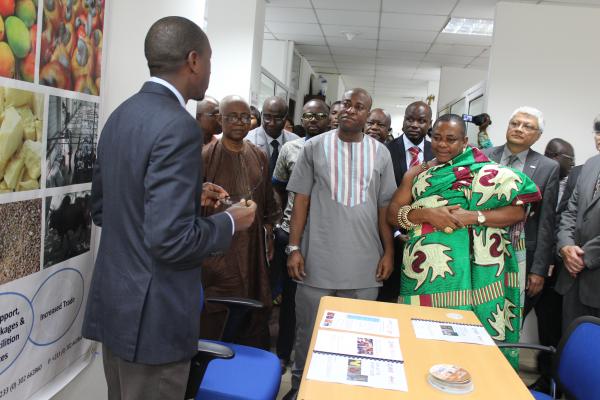AGOA Trade Resource Center in Ghana
On March 19, 2015, the African Growth and Opportunity Act (AGOA) Trade Resource Center (ATRC) was officially launched at the Ghana Chamber of Commerce and Industry (GCCI), located in Accra, Ghana. The ATRC is a joint effort between GCCI and the USAID/West Africa Trade Hub (THN). ATRC will provide new and existing local businesses with advice on becoming export-ready in order to take advantage of regional and global export opportunities, thereby fostering economic growth. Several distinguished guests were in attendance, including Nana Dr. Appiagyei Dankawoso (GCCI), Mr. Jeff Povolny (THN), Mr. Anthony Chan (USAID), Mr. Alex Deprez (USAID), and Mr. Ibrahim Murtala Mohammed (Ministry of Trade and Industry).
According to THN's AGOA/Global Value Chain Coordinator, Mr. Abou Fall, the ATRC was established to "provide market intelligence and technical assistance to businesses and exporters, and to provide market linkages to take advantage of export opportunities." Ultimately, he envisions the creation of regional linkages where local businesses in Ghana will have partners in neighboring countries. In essence, the objective of this collaborative framework between GCCI and USAID/THN is to sustainably provide services to local firms and address their export challenges, in addition to increasing trade both regionally and globally.

Cashew, along with apparel, shea, and mango, is one of AGOA’s targeted value chains and a priority crop for the USAID/THN. This means that under AGOA, the African cashew sector will receive targeted capacity building, assistance in access to finance, a friendly trade and transport environment, and a harmonized market information system.
Authorized in 2000, the AGOA legislation is a trade program that grants duty-free and quota-free treatment to over 6,400 products exported from eligible sub-Saharan African countries to the United States. Currently, 37 African countries enjoy the tariff benefits that this program offers. The eligibility requirements include implementing "best practice" regulations, such as removal of barriers to trade and investment from the US, reduction of corruption, and protection of intellectual property rights. A myriad of products are classified as duty-free under the AGOA framework, including recent additions such as handbags, watches, footwear, luggage, and apparel. Fundamentally, AGOA was created not only to strengthen economic relations between the US and sub-Saharan Africa, but also to promote regional economic growth and export diversification. AGOA is set to expire on September 30, 2015.
- Connectez-vous ou inscrivez-vous pour publier un commentaire



